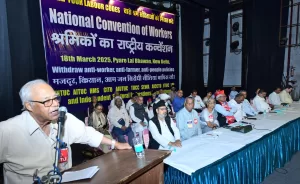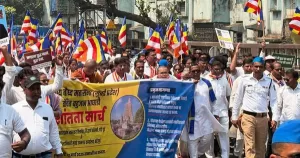Solidarity for Protesting Wrestlers Is Growing Across Social Divides
“I feel guilty if I don’t come here every day,” confides Harinder, a Jawaharlal Nehru University scholar who is currently doing his PhD on the effects of the agrarian crisis in Punjab.
Harinder, who spent a whole year with the protesting farmers at Delhi’s borders, understands what it is like to live on the road for a long time. He makes it a point to visit the wrestlers’ protest site at Jantar Mantar as often as he possibly can.
Anu, a hospitality entrepreneur from North Delhi hasn’t been able to stay away from the protest either.
“This is an issue that is very close to my heart.” Her words are measured and restrained but there is no mistaking the anger. “I hate the idea of men taking women for granted and thinking they can get away with anything. It is time we all got together and put an end to this. I’ve just met Sakshi [Malik] and Vinesh [Phogat] and they are strong, beautiful people. If they have had to face this, what hope do the rest have?”
A massive mahapanchayat of farmer leaders at Jantar Mantar on May 7 saw thousands of farmers, (including a substantial number of women) come from Punjab, Haryana, Rajasthan, Uttar Pradesh, and even Jharkhand and West Bengal to show solidarity to Sakshi Malik, Vinesh Phogat and their fellow wrestlers who have been protesting at Jantar Mantar since April 23.
At the event, Jarnail Singh, an elderly Sikh from Kirti Kisan Union, Ropar, explained how he and his colleagues struggled past many police barricades and roadblocks to make it to Jantar Mantar:
“Guru Gobind Singh Ji has taught us to stand up and defend not just our loved ones but everyone else in need as well! Guru Tegh Bahadur Ji, in fact, sacrificed his own life for someone from another religion. We are one human family, and we need to stand up for each other. These girls are, after all, our daughters too. Look at the huge number of police personnel deployed here today. If these policemen and women had been used in the correct way, how different our country would be today.”
I ask Dr. Darshan Pal, president of the Krantikari Kisan Union and a senior leader in the Samyukt Kisan Morcha why farmers have come out in support of wrestlers in great numbers. His answer is simple but insightful:
“They reached out to us and we were happy to help them. Jawan, kisan, pehelwaan [soldiers, farmers, wrestlers], these are almost synonymous terms because our soldiers, farmers and wrestlers all come from rural India. People in the villages are particularly sensitive to matters like these. A daughter is not just a family’s daughter, she is the village’s daughter as well. Hence the anger and the determination to bring culprits like Brij Bhushan Sharan Singh to justice.”
Ravi Azad of the Bharatiya Kisan Union, one of the organisers at the mahapanchayat is confident that Brij Bhushan will, indeed, be brought to justice.
“Farmers have never returned empty-handed from Delhi. We are sure we will win a victory this time, too. We are giving this government till May 21 to arrest Brij Bhushan. If that doesn’t happen, we promise you, this protest will become a movement!”
As an afterthought, he adds with almost childlike bewilderment, “One day if I ever get a chance, I want to ask Modi ji why he lies so much all the time! I don’t think the world has ever seen a president or prime minister who has lied quite as much.”
Dr. Ashish Mital, General Secretary of the All India Kisan Mazdoor Sabha who also spent a year at Delhi’s Ghazipur border during the farmers’ protest, has come from Prayagraj (earlier, Allahabad) to express solidarity. Quoting the precise chapter and verse of the Manusmriti that denies women any rights, he says:
“This is a battle between those who believe in authoritarian manuvaad and those who believe in secular democratic human rights. And the corporate world is very much on the side of the manuvaadi forces, because that is the kind of absolute power corporates want as well. And so, riding on the horse of manuvaad – or should I say cheetah, for that is the animal of choice nowadays – the corporates want to mould India in their own image. But the people won’t put up with this much longer.
“I salute these young women for their courage in choosing the path of public protest, because only a people’s movement can protect people’s rights. We are on the verge of a huge people’s movement, because people are now fed up of Modi’s jumlas. What was that slogan the BJP used before the 2014 general elections? “Bahut hua naari par vaar, ab ki baar Modi sarkaar [enough excesses on women, let’s bring in Modi’s government now]”. We can now very clearly see the Modi’s government vaar on the country’s women. Also, where are the women in the BJP and RSS? Why aren’t they standing up for these women?”
Some of the most moving expressions of solidarity have come from the most humble sources. Mohammad Aslam, a thin, elderly cobbler from the Jama Masjid area comes daily to Jantar Mantar.
He says, “I couldn’t bear the thought of these girls sitting here on the road and so I came to express my support. I have a family too, and I understand the pain of a child.”
And finally, there is Nisha, a quiet Class 10 student who finds out I will be visiting the protest. She hands me a note and says, “I have written this in Haryanvi, in the wrestlers’ mother tongue. Please pass it on to them. They will understand the language.”
The note, translated, says:
“To my wrestler brothers and sisters, I feel sad to see what has happened to you but don’t be afraid and don’t take tension. You will get justice. I am with you as are so many others. You are no less than anyone. Fight! And look after yourselves.”
It is a short, sweet note but it sums up the solidarity that so many have come forward to express.
Sakshi, Vinesh, and their comrades are not alone.
(Rohit Kumar is a writer and educator. Courtesy: The Wire.)




